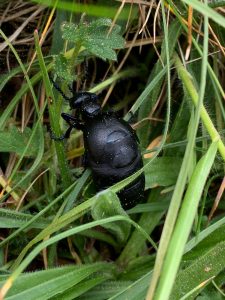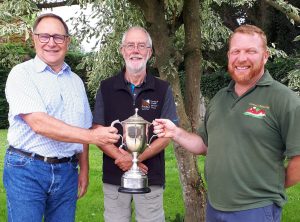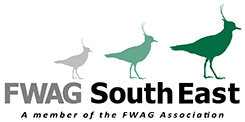


What’s On
 South Downs Farm wins FWAG Woodpecker Trophy
South Downs Farm wins FWAG Woodpecker Trophy
Roly Pewsey of Saddlescombe Farm was presented with the Woodpecker Trophy at the recent South of England Show. The winner is nominated by Sussex FWAG and the presentation is made in the CLA member tent. The judges assess a variety of aspects on the farm, from environmental management to habitat creation and monitoring.
Saddlescombe Farm is a chalk downland holding nestled in the South Downs National Park just north of Brighton. The farm prides itself on producing the highest quality grass fed beef and lamb in harmony with soil regeneration and providing a haven for wildlife. This in turn enriches the wellbeing of the numerous visitors that come each year.
With the South Downs Way running straight through the middle of the farm; the combination of livestock farming with a high level of public access can sometimes be a tricky challenge. But Rory has embraced the opportunity to engage with his local community through lambing days, direct sales, newsletters and social media.
With the support of his landlords, the National Trust, he is committed to enhancing the landscape and is a key advocate for livestock being part of the solution to Climate Change. This has been demonstrated through his work with fellow farmers within the Pasture for Life network.
Roly is an inspiration to all, due to his hard work, enthusiasm and determination, and a very worthy addition to the list of innovative farmers who have previously won this trophy. On behalf of Sussex FWAG we offer him our sincere congratulations.
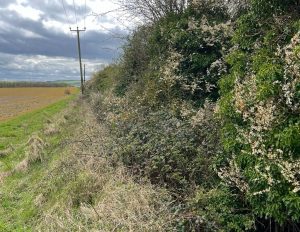 The Wessex Dormouse Project Launches!
The Wessex Dormouse Project Launches!
The South East team are excited to get started with their new project across Wessex. Hedgerows will be surveyed to assess their suitability for Dormice habitat. A number of footprint tunnels will then be placed and monitored for signs of existing Dormice.
Work will then carry on with the farmers and landowners to look at creating hedgerow corridors across the landscape. This might include areas to restore and create to ensure connectivity.
The project has received FIPL funding from the North Wessex Downs, and working closely with two farm cluster groups: Southern Streams and Wessex Farm Conservation. The project is also supported by Hampshire Dormouse Group/PTES.
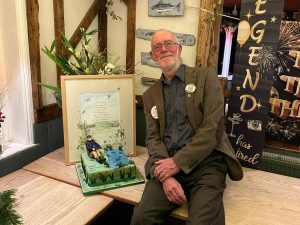 The man, the myth, the legend!
The man, the myth, the legend!
It was mixed emotions in December; we celebrated the amazing achievements of our Paul Cobb but at the same time we also had to say goodbye to him. The team gathered to enjoy a day exploring a local vineyard in Kent, accompanied by some obligatory wine tasting. There was then a surprise in store for Paul with a large gathering of family, friends, colleagues, associates, all to wish him well in his retirement.
Hamish Monro shared his thoughts and memories of Paul and the early days of FWAG. Paul started the Emston Cup, which inspired other areas to do their own awards. His knowledge and experience of all the schemes were amazing, and as with all things FWAG it was fuelled with enthusiasm, it was satisfying and productive, FWAG was always fun. Paul quietly encouraged farmers in the right direction, “you have achieved an enormous amount in rural Kent, you are much respected and the fruits of your work will long continue”.
Steve Betts, Kent Farmer, said Paul “might not look like a trailblazer but that’s exactly what he is”. Way before his time, he was out planting trees on farms in the early 80s, which was unheard of, but it started a trend across the farm and across the region.
Colin Hedley, long time colleague, compared Paul to a fine Pinot; “characterised by flavours of green apple and pear, subtle and graceful, with gentle flavours and texture. With added components of supportive, caring, committed, and unfazed.” In the early days of Farm Conservation there wasn’t a lot of incentive to encourage farmers to take up various methods or schemes but Paul’s gentle resolve and trailblazing attitude helped him build trust and relationships. Testimony to the work he carried out that conservation is now seen as a key part to farm management. He helped build a bigger, better FWAG.
Paul will still be working away quietly in the background, hard to stop when this work has been his life for so long, but from everyone at FWAG we wish you well.
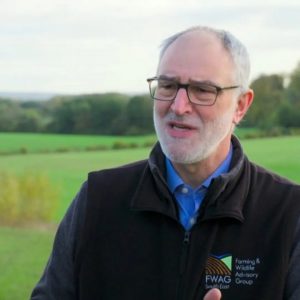 Countryfile shines light on Selborne Landscape Partnership
Countryfile shines light on Selborne Landscape Partnership
Matthew Norris-Hill was on Countryfile to discuss the excellent partnership work being carried out in and around Selborne, Hampshire.
He spoke about the farmers, conservationists and volunteers working together to provide landscape scale benefits to wildlife. The group are building on the work by Gilbert White, who monitored and explored the area of Selborne.
Over a number of years the area has been monitored and surveyed and a baseline set. The group then worked together to decide on a number of projects to improve the connectivity of habitats.
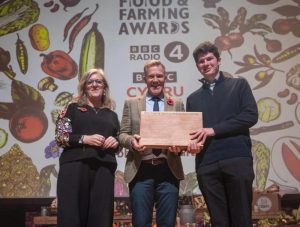 Our Jack Scott Wins BBC Award
Our Jack Scott Wins BBC Award
Jack Scott, our Assistant Conservation Adviser in Kent, has won the BBC Countryfile Young Countryside Champion for 2023! Jack was crowned winner at the BBC Food and Farming Awards 2023 ceremony.
Jack won the award for the horticultural work and public engagement initiatives he is involved in. Alongside working with FWAG he also runs his own horticultural business and hedge and wood planting. Jack works closely with his supply chains and customers, as well as running educational visits to children and young adults experience agriculture and learn more about farming.
We are all so proud of Jack and all the wonderful work he does!
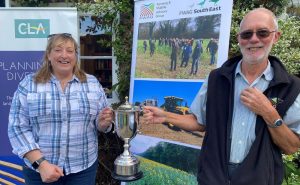 Emsden Trophy Winner 2023
Emsden Trophy Winner 2023
A Kent producer has been presented with the Kent Farming & Wildlife Advisory Group (FWAG) conservation award for its work supporting farmland birds and rare plant species.
The 2023 Country Land and Business Association (CLA) Emsden Trophy was presented to Watts Farms, a family-run business growing more than 60 different crops, supplying over 500 restaurants as well major retailers and the NHS.
The awards presentation and drinks reception was hosted by last year’s winner, Fidelity Weston of Romshed Farm near Sevenoaks.
On a fine summer evening CLA members and other guests enjoyed a tour led by Fidelity of the 200 acre family farm which is certified Pasture for Life and organic with the Soil Association, farming Hereford cattle, sheep and poultry.
Improving the farm for nature is central to their approach and it is currently in Higher Tier Stewardship with an emphasis on wildflower meadow restoration and woodland edge scrub development.
The stock are on a rotational and part mob grazing system, which Fidelity believes benefits the biodiversity on the farm. She runs educational visits focussing on the soil and the benefit that livestock bring.
Keen to ask her visitors on the day what they thought about diversifying and managing grasslands and how to tackle problems such as thistles, Fidelity got plenty of response from FWAG advisers present Debbie Reynolds, Paul Cobb and Jack Scott!
Joe Cottingham, Director at 2023 Emsden recipient Watts Farms, said: “We are absolutely delighted and very proud that Watts Farms has been awarded this year’s Emsden trophy. We very much see ourselves as caretakers of the land we farm for future generations, and as such monitor all of our actions against the environment, to ensure that the baton can be passed on.”
Recent projects include improving soil structure and increasing the pollinator population by introducing legume-rich mixes including phacelia and vetch mixes, and working with Farningham Woods nature reserve to improve habitats which has resulted in a rise in Deptford pinks – an endangered species.
Meanwhile the wetland area helps to increase the dragon fly population that in turn has seen an uplift in birds such as the Hobby that reside along the woodland edges. In recent years Nightjar have also returned.
Kent FWAG adviser Paul Cobb said: “Watts Farms is an excellent example of a modern efficient farm business supplying to a demanding market that devotes time and resources to conserving wildlife on its farms.
“The interest and dedication shown by the team at Watts Farms in encouraging and monitoring species of conservation concern such as farmland birds and the rare Deptford Pink is really inspiring.”
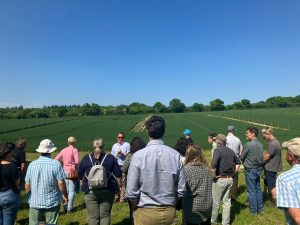 Woodland Creation and Carbon talk, hosted at Newhouse Farm, Hampshire
Woodland Creation and Carbon talk, hosted at Newhouse Farm, Hampshire
Featured discussions surrounding how to stack public and private funding, as well as carbon additionality. Jade Hemsley, Forestry Commission, (FC) began the afternoon with a detailed overview of woodland creation through an England Woodland Creation Offer (EWCO). This was followed by a discussion surrounding Woodland Carbon Code and Woodland Carbon Guarantee, covered by Mark Broadmeadow (Head of Climate Change at FC), Chris Waterfield (Carbon and Water Adviser at FC), Andy Baker (UK Woodland Carbon Markets Adviser at SF) and Annie Gordon (Carbon Markets Project Manager at FC). Andy Bason, Farm Manger at Newhouse Farm gave an overview of the woodland creation on the farm. The first site was an agro-forestry set up, with rows of fruit and nut trees at 36m intervals in a cereal crop. The second site was an EWCO funded plantation, planted with a mix of native and non-native species. The attendees quizzed Andy on his thoughts surrounding the projects and there was a focus on how best to protect the trees from deer damage. The event summarised the importance of a whole farm approach to woodland planting and the need for continued maintenance following funding.
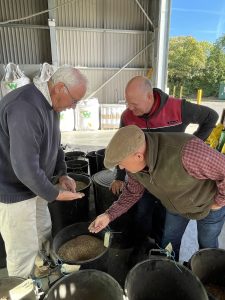 A Harvest With A Difference
A Harvest With A Difference
FWAG South East advisor Debbie Reynolds visited T Dennes & Sons with farmers Wayne and Gary Coomber to see how their enterprising new Kent Wildflower harvesting business is managed from field to packet. Director, Mr Chris Denne, provided an insightful look at the process of harvesting in the meadow, identifying species from seed, to the end product of a valuable wildflower mixture.
Farmers Wayne and Gary, from Headcorn, were there to witness their own native provenance organic wildflower seed being removed from the seed head, through a range of labour-intensive processes, to create a species rich Kent Wildflower mixture.
Wildflower meadows have declined by 97% since the 1930’s. Identifying remnant meadows and sites of high species diversity provides an exciting opportunity for wildflower seed harvesting. Sensitive harvesting methods need to be observed to ensure the value of sites is not jeopardised and any site designation restrictions adhered to.
FWAG South East were able to identify this opportunity during a site visit to Wayne and Gary’s farm in West Kent. As farmers they are dedicated to large scale restoration of lowland meadows and produce high quality herb rich organic hay.
To discuss if your land could be a donor site or to find out how to establish a meadow please get in touch. Projects like this highlight the value of farmers, advisors and suppliers working together.
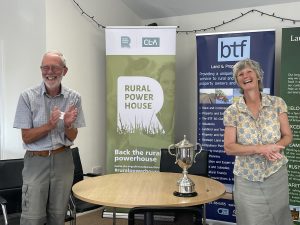
 Conservation Award for Kent Farmer
Conservation Award for Kent Farmer
Kent FWAG adviser Paul Cobb nominated this years winner of the Emsden Trophy, Fidelity Weston, based on her conservation work both on and off the farm: ‘Romshed Farm has been a shining example of conservation in the service of food production over many years, and Fidelity has worked tirelessly with neighbours and other organisations to achieve this, as well as showing a wider audience and especially the younger generation the benefits. FWAG is delighted to nominate her to receive the Emsden Trophy in 2022.’
Fidelity manages the family’s 80ha farm outside Sevenoaks in Kent, running Hereford cattle and Lleyn ewes to Pasture for Life and Soil Association standards.
Fidelity is actively involved in local conservation projects and the cattle are increasingly being used to graze land away from the farm as the local interest in “wilding” has grown. The farm itself has a strong emphasis on biodiversity and in particular on wildflower meadow creation and restoration. There is an ongoing programme of educational visits, Open Days and meat sales direct from the farm.
“Farming can be done in a way that supports and encourages biodiversity both above ground and in our soils and we as farmers should be seen as the solution and not the problem. I hope I can continue to promote the benefits of bringing conservation and farming together to ensure we get the right policies in place to support farming into the future. Awards such as The Emsden Trophy promote the importance and value of this and I feel very honoured to be awarded this Trophy.”
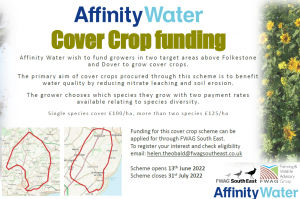

 Funding Available for Cover Crops in Kent
Funding Available for Cover Crops in Kent
We have partnered with Affinity Water to offer farmers within catchments around Folkstone and Dover the chance to apply for funding for cover crops. The aim is to reduce soil erosion and improve water quality in the area. Two types of species mix are available, you choose what is best for you. Click the image for more detail or contact our adviser Helen Theobald: helen.theobald@fwagsoutheast.co.uk
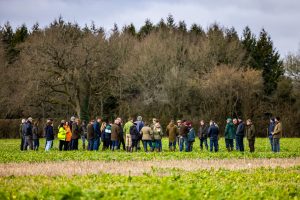 Cover crops and the new ELM schemes
Cover crops and the new ELM schemes
In February we held our first event of the year with a visit to cover crop trial plots in the Woodgarston catchment, as part of a project with South East Water. The morning began with a tour of the cover crops and was followed by presentations by South East Water, Frontier Agriculture and FWAG South East. Discussions focussed on the impact of cover crops on nitrogen, their management and the inclusion in current and future schemes. The results from this project clearly show the importance of cover crops to reduce nitrate losses to groundwater, with the potential of cover crops to retain at least 3 times more nitrate than a stubble field.
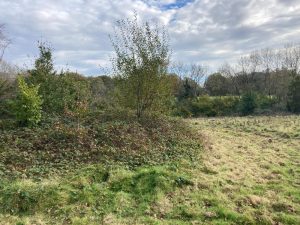 Re-wilding: farmers friend or foe?
Re-wilding: farmers friend or foe?
There has been lots in the news recently about re-wilding and natural regeneration. It has become quite the contensious issue and dividing opinion; for some it’s seen as the only way forward, while others see that it has no place in modern farming. However, does it have to be an all or nothing approach?
A farm we’ve been working with in Kent has shown that you can have both. They’ve identified an area of the farm that wasn’t productive so have turned it over to a small-scale wilding project. They only carry out a bit of mowing just to keep the scrub in check and to stop the flowers from being overwhelmed.
So next time you’re looking at your farm plans you might be able to find an area that you could make into a wildlife oasis. We can advise on how best to manage the area, and also find out if there would be any funding available for it.
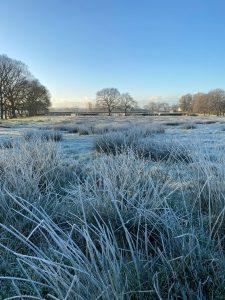 Magic Memories: Musings by Paul Cobb
Magic Memories: Musings by Paul Cobb
If you are at a loose end on winter nights during this New Year period, may I suggest trying a little Magic? Not the David Copperfield sort, but visiting the magic.defra.gov.uk website. From its origins in mapping the more obvious designations like Nitrate Vulnerable Zones, Magic has evolved into a source of all kinds of information about your farm. Groundwater vulnerability? Check. Priority habitat? Check.
Nothing shows up how little we know about our farms’ history more than the Historic Environment Record (HER). The HER is not on Magic, and the only time most people come across it is in Stewardship scheme applications, when it is received and promptly forgotten. The historic environment has always been the poor relation in Stewardship and I fear it will be the same in ELMs. I’ve yet to come across a farmer who knows about anything in their HER, unless it coincides with a bit of family history or is glaringly obvious.
Unfortunately, a lot of historical stuff isn’t obvious. Take the farm I did a survey on recently. The HER told me it has an old moated farmstead site, and helpfully the modern map has ‘moat’ next to it in an antique script, as well as a nearby ‘Moat Farm’. Enough clues? On the ground, what’s left of the moat looks like a couple of mucky old ponds, but it’s medieval, and part of a larger site where the moat (which was a status symbol rather than a real military defence) would have gone round the whole main building. The farmstead shows quite clearly on a 1946 air photo and post war map, but I didn’t find any remnants of it – if there are any, they will just look like any old bricks and rubble. The whole site is scrubby, overgrown and un-managed, so it’s perfect for wildlife as well.
Then there is the World War Two command post on another farm that looks like nothing more than an old breeze-block shed. Because it was a breeze-block shed; but in its day it directed a battery of guns nearby, targeting Hitler’s bombers coming over the coast en route for London. These sites look like a mess to be cleared up, or handy rubble for some hardcore. But people lived and died on that moat site maybe as far back as the 13th century; your father or grandfather might have telegraphed a signal from that shed to the guns, his knuckles white on the telephone receiver.
History might be hidden, but it’s not dead. All those places, and the people who lived and worked there, give depth and meaning to the countryside you live in now. So get on to Magic, dig out that old HER, and bring the past to life.
(originally published in Farmers Weekly)
We Struck Oil!
When you think of the Wiltshire countryside you think of open rolling landscapes and ancient monuments; what you don’t think of is oil! But we’re not talking about the liquid, we’re talking about the Oil Beetle. Like the fossil fuel it’s black, and iridescent and rare, and if you find it on your land you should count yourself lucky.
FWAG SE Adviser Karen Davies came across one while out surveying: “I was looking for some small indicator plants when I realised I was looking at a chunky iridescent beetle. Not just one, but there were several of them; apparently if there is suitable habitat you may find a few together.”
Oil beetles have been identified as priorities for conservation action through the UK Biodiversity Action Plan (UKBAP) – meaning work needs to be done to conserve them and their habitats. Oil beetles are reliant on solitary bees to compete their life-cycles, therefore the health of oil beetle populations is dependent on the health and diversity of wild bees. The ideal habitat for oil beetle species is wildflower-rich grassland. Oil beetles are sensitive to changes in land management and are a good indicator of the health of our countryside.
These beetles were found on quite short, unimproved chalk grassland, on quite a steep bank which is why it had been left unimproved. Basically they need flower rich pasture so anything maintaining existing species rich grassland or creating and enhancing species rich grassland is key for this species.
Top award for Kent salads and cereals producer recognising years of conservation work
A Kent salads and cereals producer has been recognised for its dedication to conservation work with a top award.
Laurence J Betts Ltd, which has sites at Offham, Yalding and Hadlow, has been honoured with the CLA’s Emsden Trophy, which celebrates conservation efforts in Kent.
The business is focused on the production of wholehead and babyleaf salads for the catering and retail markets, and also grows a range of combinable crops. It was nominated by Kent Farming & Wildlife Advisory Group (FWAG) and presented with the award at an event supported by BTF Partnership this week.
Paul Cobb, Kent FWAG adviser who nominated Laurence J Betts, praised the focus on good soil management, while the farm has several areas for birds and pollinators and its woodlands are actively managed by coppicing.
Paul said: “Stephen, Nick and the team have shown a dedication to conservation and the environment over many years, and I am delighted to nominate L J Betts Ltd to receive the Emsden Trophy in 2021.”
The company, which is run by Stephen Betts with directors Nick Ottewell and Alison Tanton, was praised for its dedication to “producing food safely while meeting high environmental standards”. It is LEAF Marque-accredited and the Offham farm has been involved in a ‘Test and Trials’ group for the Defra’s Environmental Land Management scheme.
Mr Betts said: “We at Laurence J Betts have always endeavoured to nurture our understanding of the real value of the environment, as well as keeping up with the constantly evolving stories of biodiversity loss, climate change and pollution. Consequently, we are continually developing and ultimately maintaining sustainable farming practices that are balanced with biodiversity, our natural surroundings and the wider environment.
“We are therefore delighted, proud and privileged to receive such a prestigious award that recognises our efforts and this will only help to inspire us to continue learning, adapting and moving forward.”
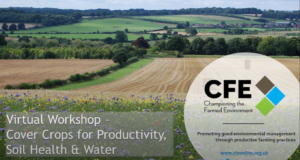 Cover Crops for Productivity, Soil Health & Water
Cover Crops for Productivity, Soil Health & Water
26th November 2020
Paul Cobb (FWAG adviser and CFE coordinator) hosted a virtual webinar on the cover crop project, in collaboration with Affinity Water.
Speakers included Paul Brown (Technical adviser, Kings seeds ), Doug Taylor (farm manager) and Shaun Dowman (Agricultural Advisor, Affinity Water).
The presentation highlighted why water companies wished to engage more with farmers, discussing experiences of cover crop establishment and management and looked at trial’s results.
You can watch the webinar here.
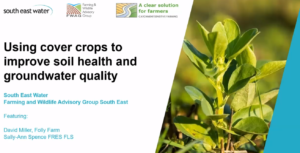 Improving Soil Health through Cover Crops
Improving Soil Health through Cover Crops
10th November 2020
A virtual workshop discussing the cover crop trials in the Woodgarston catchment, in collaboration with South East Water.
Speakers included Tim Clarke (FWAG adviser), Sally-Ann Spence (entomologist) and David Miller (farm manager). Topics included discussing the project’s results for nitrates in the soil-water below cover crop plots, soil health and beneficial invertebrates.
For more information, please visit the project page here.
